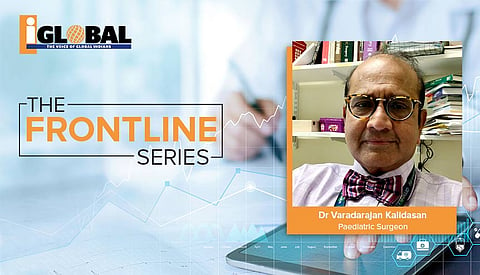

As part of our Frontline Series, ‘iGlobal’ goes behind the scenes with another leading medic in the National Health Service (NHS) to get some crucial health and safety answers around Covid-19 vaccines as well as messages of hope from the healthcare frontline.
Dr Varadarajan Kalidasan is a Consultant Paediatric Surgeon at the Royal Alexandra Hospital for Children and Director of Education at the Brighton and Sussex University Hospitals (BSUH), a position he has held for nine years. His career path to the NHS follows an exciting international trajectory, having begun with his training in Chennai, India, and moving to Melbourne, Australia, and then Dublin, Ireland, as a senior registrar. He went on to be awarded a medal for his paediatric surgery fellowship exam at the Royal College of Surgeons of England.
On his journey with the NHS, he reflects: “I just wanted some high-end training and a different experience. But the main thing that made me stay in the UK was the NHS.
“I find that because I have worked in the NHS, I don't have a big private practice. I have a very small private practice, which is almost accidental. But mostly, 99 per cent of my work is NHS work; and I enjoy doing it.
“I find it works so well because you don't have to worry about anything, you just do what is right for the patient. I like that whole concept.”
As someone who was among the first set of frontline medics to receive the Pfizer/BioNTech vaccine to protect against Covid-19, Dr Kalidasan answers some key questions around the jabs to allay fears and also gives an insight into what a career with the NHS has to offer.
Q: Can you please share your experience of getting the vaccine?
A: I have had both doses of the Pfizer vaccine and my experience was pretty good. My first dose was virtually on the day it started, December 8, and I was amongst the first few people to have it. And I then had my second dose 21 days later.
I had no problem, apart from a little bit of pain in my arm after the second dose, but that is to be expected.
Q: What is your message to those in the community who may have doubts about getting vaccinated?
A: A lot of people just do not understand why the vaccine has been passed so quickly. There are a few reasons behind how it was passed quickly. To begin with, there was a lot of investment in getting the vaccines and research set up; often you don't get so much funding for scientists to research and you don't have many scientists working on it at the same time.
The problem is that most people have no idea how scientific research is done but they all think they do, and unfortunately some people will spread rumours on social media.
Q: What are some of the coping mechanisms that help you balance the extra work pressures, stress, and tragedy through the pandemic?
A: I think we need to focus on what is really important, which is looking after your patients, your colleagues, and then when you leave work you have to completely get out of the work mode when at home.
Outside of work, I do a lot of running, a lot of exercising and I listen to music. I have a few good friends who I speak to occasionally and regularly meet on Zoom every week with some of my friends from medical school.
Q: What have been some memorable moments during the course of the crisis since last year?
A: The memorable moments for me have been when some of my friends have been very ill and they have recovered. And also, because I am the Director of Medical Education, the way the younger doctors and trainees have really adjusted to this challenge has been very memorable for me. Also, the kindness and appreciation the public has shown for the NHS. Those have been the three most important and memorable things for me.
Q: What would be your message to those considering a career with the NHS?
A: When you take up a career in the NHS you should remember that it is not just being a doctor or a nurse. The NHS is one of the biggest employers in the UK, and indeed the world.
For example, we run various fairs in our schools and colleges in Brighton as people often forget that a career in the NHS can be in many areas. We have jobs across something like 30-40 different specialties, apart from being a doctor, nurse, or midwife.
So, I think people should definitely look at a career in the NHS.
*Opinion expressed is personal and does not reflect the views of BSUH NHS Trust